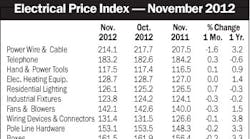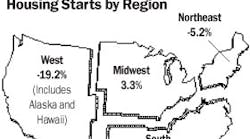Earnings from the electrical industry's publicly held companies are starting to look better, and their executives are expressing guarded optimism.
W.W. Grainger
Record sales of $8.1 billion for the year, up 12% over 2010. Net earnings of $658 million, up 29%.
“We continue to see a long runway for growth and are investing aggressively in our proven growth drivers: product line expansion, sales force expansion, e-commerce, inventory services and international expansion,” said Jim Ryan, chairman, president and CEO. For the full year 2012, the company is forecasting sales growth of 10 to 14 percent.
Rockwell Automation
Sales of $1.5 billion in first quarter 2012, up 8 percent year over year. Net income of $183.3 million, up 22% over Q1 2011.
“Quarter 1 was a story of great earnings growth on good but uneven sales results,” said Keith Nosbusch, chairman and CEO in an earnings call with analysts. “On the sales front, in a continued uncertain global environment, we were pleased with 8% year-over-year organic growth. But there were mixed results by region. Europe, the region you might expect to be the weakest, was strong. And Asia, the region you would expect to be strong, was the weakest. I believe that during this period of moderating sales growth rates, we will continue to see mixed growth rates by region, as uncertain economic conditions, solutions, lumpiness and prior-year comparisons have a greater impact on growth rates.”
Eaton
Quarterly sales up 10% to $4 billion; net income up 29%.
Eaton Corp.'s revenues in December fell roughly $200 million short of the company's expectations, but were partially offset by a lower tax rate and better segment operating margins. “About 75 percent of the revenue shortfall was in our Electrical sector, with the shortfall spread evenly among the U.S., Europe, and Asia Pacific,” said CEO Sandy Cutler. “The shortfall in the U.S. was principally due to customer requested delays of major project shipments. The shortfall in Europe was due to the slowing Eurozone economy, and in Asia Pacific the shortfall was due to a slowdown in China as a result of restrictions on credit availability.”

